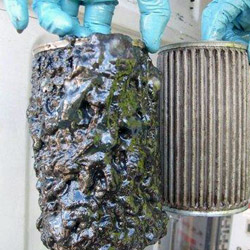
Bacteria found in diesel fuel primarily belong to two main types: aerobic and anaerobic bacteria. These bacteria can thrive in the water that accumulates in fuel storage tanks and fuel systems, especially when there’s a lack of proper maintenance or when the fuel is contaminated.
- Aerobic Bacteria: These bacteria require oxygen to survive and typically grow at the fuel-water interface where oxygen is available. They can cause biofilm formation on the tank walls and fuel system components. Common aerobic bacteria found in diesel fuel include species of Pseudomonas, Acinetobacter, and Aeromonas.
- Anaerobic Bacteria: Anaerobic bacteria thrive in environments with little to no oxygen. They are often found in the deeper layers of the water accumulated at the bottom of fuel storage tanks. Anaerobic bacteria are typically responsible for producing hydrogen sulfide gas, which can lead to fuel degradation and foul odors. Common anaerobic bacteria found in diesel fuel include species of Desulfovibrio and Clostridium.
These bacteria can cause various problems in diesel fuel systems, including fuel degradation, filter clogging, corrosion of metal surfaces, and the production of harmful by-products such as acids and sludge. To prevent bacterial contamination in diesel fuel, it’s essential to regularly monitor and maintain fuel storage tanks, ensure proper water drainage, and use fuel additives designed to inhibit microbial growth. Additionally, keeping tanks full to minimize the air-water interface can help reduce the growth of aerobic bacteria.
To test your fuel and fix the problem contact www.dieselcraft.com sales@dieselcraft.com

Recent Comments